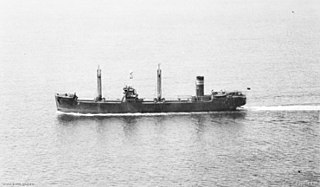
A steamship, often referred to as a steamer, is a type of steam-powered vessel, typically ocean-faring and seaworthy, that is propelled by one or more steam engines that typically move (turn) propellers or paddlewheels. The first steamships came into practical usage during the early 1800s; however, there were exceptions that came before. Steamships usually use the prefix designations of "PS" for paddle steamer or "SS" for screw steamer. As paddle steamers became less common, "SS" is assumed by many to stand for "steamship". Ships powered by internal combustion engines use a prefix such as "MV" for motor vessel, so it is not correct to use "SS" for most modern vessels.

The Pacific Mail Steamship Company was founded April 18, 1848, as a joint stock company under the laws of the State of New York by a group of New York City merchants. Incorporators included William H. Aspinwall, Edwin Bartlett, Henry Chauncey, Mr. Alsop, G.G. Howland and S.S. Howland.

SSCity of Glasgow of 1850 was a single-screw passenger steamship of the Inman Line, which disappeared en route from Liverpool to Philadelphia in January 1854 with 480 passengers and crew. Based on ideas pioneered by Isambard Kingdom Brunel's SS Great Britain of 1845, City of Glasgow established that Atlantic steamships could be operated profitably without government subsidy. After a refit in 1852, she was also the first Atlantic steamship to carry steerage passengers, representing a significant improvement in the conditions experienced by immigrants. In March 1854 City of Glasgow vanished at sea with no known survivors.

SS Iron Knight was a bulk carrier that was built in Scotland in 1937 for the Australian Broken Hill Pty, Ltd (BHP) to carry iron ore. A Japanese submarine sank her by torpedo off the coast of New South Wales in 1943, killing 36 of her crew. A wreck that was identified as that of Iron Knight is protected by the Australian federal Underwater Cultural Heritage Act 2018.

SS City of Johannesburg was a British cargo steamship that was sunk in 1942. She was built by Barclay, Curle & Co, of Whiteinch, Glasgow for Ellerman Lines Ltd, of London in 1920, being launched as SS Melford Hall. She was renamed SS City of Johannesburg in 1926 and registered in Liverpool.
Britannia may refer to any one of a large number of ships:

Persia was a British passenger liner operated by the Cunard Line that won the Blue Riband in 1856 for the fastest westbound transatlantic voyage. She was the first Atlantic record breaker constructed of iron and was the largest ship in the world at the time of her launch. However, the inefficiencies of paddle wheel propulsion rendered Persia obsolete and she was taken out of service in 1868 after only twelve years. Attempts to convert Persia to sail were unsuccessful and the former pride of the British merchant marine was scrapped in 1872.

Empire Chaucer was a 5,970 GRT cargo ship which was built in 1942 by William Pickersgill & Sons Ltd, Sunderland. She was built for the Ministry of War Transport (MoWT). Completed in May 1942, she had a short career, being torpedoed and sunk by U-504 on 17 October 1942.
SS Iron Chieftain was a bulk carrier that was built in Scotland in 1937 for the Australian Broken Hill Pty, Ltd (BHP) to carry iron ore. A Japanese submarine sank her by torpedo off the coast of New South Wales in 1942, killing 12 of her crew. Her wreck is protected by the Australian federal Underwater Cultural Heritage Act 2018.
William Patterson Shipbuilders was a major shipbuilder in Bristol, England during the 19th century and an innovator in ship construction, producing both the SS Great Western and SS Great Britain, fine lined yachts and a small number of warships.
Numerous vessels have borne the name Coromandel, named for the Coromandel Coast.

City of Edinburgh may refer to a number of ships, all named after the city of Edinburgh, Scotland:
Several ships have been named Borrowdale for Borrowdale:

Suffolk was a refrigerated steam cargo ship built in 1899 by the Sunderland Shipbuilding Co. of Sunderland for Federal Steam Navigation Company of London to transport meat and other produce from Australia and South America to United Kingdom.
SS Tokomaru was a British steam cargo ship built in 1893 as Westmeath by C. S. Swan & Hunter of Wallsend for a Sunderland shipowner. The steamer was sold the following year to Shaw, Savill and Albion Steamship Company, renamed Tokomaru, and converted to a refrigerated ship for their New Zealand and Australian routes. In January 1915 the ship was torpedoed and sank off Le Havre, France.
Several ships have been named Ajax for Ajax the Great, a figure from Greek mythology:
Several ships have been named Woodlark after the woodlark:
SS Tregarthen was a cargo steamship that was built in Scotland for the Hain Steam Ship Co in 1936. She was sunk with all hands by a U-boat in 1941 in the Battle of the Atlantic.
This page is based on this
Wikipedia article Text is available under the
CC BY-SA 4.0 license; additional terms may apply.
Images, videos and audio are available under their respective licenses.








